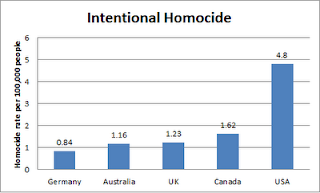Unfortunately the news surrounding gay rights has not
been entirely rosy. The West did appear to move forward together, the same
cannot be said of other countries. The biggest anti-gay news came out of Russia
and India which seriously disappointed gay rights activists. Africa and the
Middle East continued their terrible reputation with gay rights.
Gay Rights – Russia
When the Soviet Union finally collapsed in 1991 the new
Russia seemed eager to show its progressive side on social issues. In 1993 gay
sex was legalised, four years later transgender people could legally change
their gender and in 1999 homosexuality was declassified as a mental illness.
Then came Vladimir Putin, he rose to Prime Minister in 1999 and after only a few
months became President following Boris Yeltsin’s resignation. Originally he
did nothing to gay rights, but as the years progressed he began to ally himself
with the homophobic Russian Orthodox Church. To help cement the support of the
religious right, he (and his United Russia party) began hacking away at gay
rights. Although homosexuality is still legal in Russia, a law was passed last
year that made ‘homosexual propaganda’ illegal.
The law itself is truly terrible and stops any sort of
gay pride event or meeting in which homosexuality is discussed positively. In
Russia if you break the law as an ordinary citizen you are fined 5,000 Russian
roubles (£93/$153/€110). For public officials the fine is 50,000 roubles
(£932/$1,525/€1,102), the maximum fine for organisations is 1 million roubles
(£18,631/$30,500/€22,037) and they must halt activity for up to 90 days. If you
try and ‘promote homosexuality’ over the internet you can get fined 100,000
roubles (£1,863/$3,050/€2,204)! If you are a foreigner you can expect to get
detained for 15 days before being deported, after paying your 100,000 rouble
fine of course.
The disgraceful treatment of gays has resulted in people
calling for a boycott of the Winter Olympics, which are to be held in Sochi,
Russia later this year. Particularly vocal have been George Takei, an American actor,
and Stephen Fry, a veteran British broadcaster. Both are openly gay and have
drawn on their substantial fan base to call for a boycott of the games. In Fry’s
letter to Prime Minister David Cameron he compared Putin’s treatment of gays to
Hitler’s treatment of Jews in 1936, when the Olympic Games were held in Berlin.
It is worth noting that Fry is of Jewish descent and had relatives die in the
Holocaust.
Gay Rights Elsewhere
India was the only other country to produce major
anti-gay news. In 2009 the Delhi High Court ruled that Section 377 was
unconstitutional and that all prohibitions on consenting sexual activities
between adults that did not involve a commercial transaction were also
unconstitutional. Section 377 of the Indian Penal Code was passed in 1860 by
the ruling British government. Unfortunately the Supreme Court of India decided
in December that the colonial era law was actually constitutional. This meant
that gay sex was once again illegal in India.
It is a bit ironic when you think about it: When this law
was passed in 1860, Britain was highly homophobic whereas India was not. Fast forward
160 years and you find a homophobic India and Britain leading the pro-gay
rights charge!
Uganda has been at the centre of attention for several
years now in relation to gay rights. Homosexuality is already illegal in
Uganda, being found guilty of it could result in up to seven years of
imprisonment. Yet for some that is not enough! In 2009 MP David Bahati
introduced a bill that would call for the death penalty for people who had gay
sex on multiple occasions. It was dubbed the ‘kill the gays bill’ and got
immediate international attention, which resulted in it failing. Then last year
the Speaker of Parliament, Rebecca Kadaga, introduced a new bill that was not
quite as harsh as the original bill, but still demanded the death penalty for ‘aggravated’
homosexuality. That bill passed Parliament last month and new awaits President
Yoweri Museveni’s signature.
More minor bad news for gay rights came out of Croatia,
Zimbabwe and Australia. In Zimbabwe a referendum was held at the same time as
other elections that banned same-sex marriage constitutionally. Considering Zimbabwe
was never going to legalise same-sex marriage, this has little affect. Similarly
Croatia had a referendum in which marriage was defined as being between one man
and one woman. The result was 66% against marriage equality. It wasn’t entirely
bad news though as the government immediately announced that it would try and
pass a civil union bill this year. In Australia the Australian Capital
Territory (Canberra) became the first Australian jurisdiction to legalise same-sex
marriage! Hurray! Not so fast, unfortunately the federal government challenged
the constitutionality of the same-sex marriage law, the court unfortunately ruled
in the government’s favour. This means that gay marriage will not be becoming
legal any time soon in Australia.
.jpg)
.jpg)




